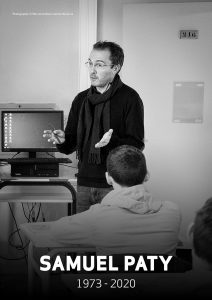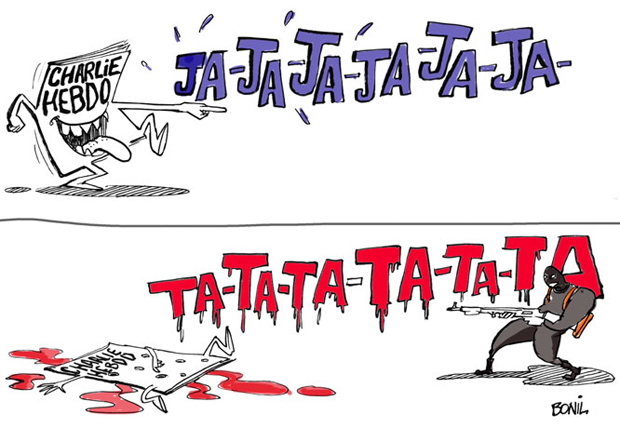Index relies entirely on the support of donors and readers to do its work.
Help us keep amplifying censored voices today.
[vc_row][vc_column][vc_single_image image=”115559″ img_size=”full” add_caption=”yes”][vc_column_text]In the last month, as the world has been preoccupied with the US elections and the ongoing ravages of the global pandemic, the people of France have turned on the news to learn of deadly terror attacks on their soil. Seemingly designed not just to murder and incite fear but as a direct attack on the core values of the French state.
In a Parisian suburb, Samuel Paty was beheaded by an extremist for teaching his students about the principle of free speech. In Nice, three people – Vincent Loques, Simone Barreto Silva and Nadine Devillers – were brutally murdered inside the ultimate sanctuary: a place of worship, the Notre-Dame basilica. Their ‘crime’? Attending church.
As ever in our interconnected world, a terror attack in one country has repercussions across the world and this has never been truer. Our choice of language and vocabulary when discussing such emotive issues can have untold consequences and when you combine the issues of national security, religion, extremism and politics, people rarely look beyond the headlines.
But it is unforgivable for national leaders to exploit the pain and anguish of others to promote their own world view and to shore up their own political standing. And beyond the pandemic that’s what we’ve seen. Rather than acknowledging the pain felt by the people of France and the fear that now lurks in many communities, not least French Muslims who now face a wave of hate for acts that had nothing to do with them, some national leaders are exploiting these horrendous events for their own benefit.
The actions of the presidents of Turkey and Pakistan to sow division and attack the French state have done little more than incite even more hate and anger. I’m choosing not to repeat their claims – as I don’t believe any good comes from dissecting their words – although others have.
There is not nor ever can be any excuse for murdering innocent people. This is all the more true in a democracy, such as France, where people have the legal right to protest, to challenge their politicians in court, to campaign against them and to write daily in national newspapers. We have legal ways to challenge the status-quo – violence is never a legitimate tool of protest and there can be no excuses made for its use.
Index’s raison d’etre is to defend our collective rights to free speech and free expression. That doesn’t mean that we don’t appreciate the tensions that exist between all of our basic human rights as outlined by the Universal Declaration of Human Rights.
There can be a tension for some between the right to free speech and the right of freedom of thought, conscience and religion. These tensions should be considered and discussed in every home, school and institution in every country. There should be a national conversation about how we find a balance as a society, we should use more words and have more debate about the type of world we want to leave in. And we should do all of this without the threat of violence.
We stand with the people of France, as they mourn the loss of Samuel Paty, Vincent Loques, Simone Barreto Silva and Nadine Devillers – may they rest in peace.
And we stand for the values that they represented.
[/vc_column_text][/vc_column][/vc_row][vc_row][vc_column][three_column_post title=”You may also like to read” category_id=”41669″][/vc_column][/vc_row]
[vc_row][vc_column][vc_single_image image=”115302″ img_size=”full” add_caption=”yes”][/vc_column][/vc_row][vc_row][vc_column][vc_column_text]Samuel Paty
An educator.
A father.
A martyr.
An inspiration.
Last week Professor Paty was brutally murdered in a Parisian suburb for teaching his students about the basic human right of free speech. A right that is protected by both the French constitution and the European Human Rights Act. A right that we cherish and celebrate.
Our hearts bleed for the pain and sorrow that this tragedy has visited upon his loved ones and the people of France. We stand with them.

Samuel Paty, photo: Ville de Conflans Saint Honorine
No context is or should be required to try and understand this horrendous act. There are no excuses, justifications or mitigations. Professor Paty was doing his job. He was a citizen of the world, educating the next generation about the importance of speech, of language, imagery and art, and their protected place in society. This was a public service undertaken in a public space. He was doing his duty and he was assassinated for it.
As we mourn Samuel’s loss, 14 French citizens are on trial for the massacre at the Charlie Hebdo offices. A further seven people have been arrested related to Samuel’s murder. These people do not represent France. Samuel Paty represents France. These people represent extremists. Samuel Paty represents the mainstream. Those arrested represent hate and fear. Samuel Paty represents hope.
There will be lots or recriminations in the months and years ahead: politicians attempting to exploit people’s fears for their own gain, others trying to excuse or apologise. Neither is acceptable. As a society, it is vital that we come together to celebrate our shared values, in spite of every effort made by some to undermine and attack those values.
In the months ahead Index will continue to report on the Charlie Hebdo case. We will highlight the efforts of French leaders who, in the face of terror, stand tall and use their free speech to protect ours.
And most importantly we will remember.
Samuel Paty, 1973-2020.
He will never be forgotten. We mourn his loss together and we must remember his legacy every time someone tries to undermine or restrict our free speech.[/vc_column_text][/vc_column][/vc_row][vc_row][vc_column][three_column_post title=”You might also like to read” category_id=”581″][/vc_column][/vc_row]
[vc_row][vc_column][vc_single_image image=”114664″ img_size=”full” add_caption=”yes” alignment=”right”][vc_column_text]Frédéric Boisseau
Franck Brinsolaro
Jean Cabut
Elsa Cayat
Stéphane Charbonnier
Philippe Honoré
Bernard Maris
Ahmed Merabet
Mustapha Ourrad
Michel Renaud
Bernard Verlhac
Georges Wolinski
These people were brutally murdered on 7th January 2015. Their “crime” was to work for the French satirical publication Charlie Hebdo.
Whatever your views on the content of the magazine, on their cartoons, their editorial line and their publication of an image of the Prophet Mohammed, the reality is that these people were massacred because of a cartoon. They didn’t threaten anyone. They just went to work on a normal day and were never to return to their families.
This week a terror trial has commenced in France. Fourteen people are charged with being accomplices to the terrorists who murdered 12 people at the offices of Charlie Hebdo, injured a further 11 people and then two days later murdered four people at a Jewish supermarket.
These were acts of terror. Designed to silence and scare. They were attacks on free expression and on freedom of religious belief. They were a hate crime. And even worse they led to more hate, more fear and more abuse towards the French Muslim community.
Index won’t publish the names of the perpetrators. These people sought to divide their country. They sought to sow the seeds of hate and distrust. They are not worthy of our time or consideration.
Today we remember the victims, the survivors and their friends and families. There is nothing more to say.[/vc_column_text][/vc_column][/vc_row][vc_row][vc_column][/vc_column][/vc_row]
[vc_row][vc_column][vc_column_text]
On 7 January 2015, two gunmen entered the Paris offices of Charlie Hebdo and murdered 12 people, including most of the senior editorial staff. The attack was in reprisal for the satirical magazine’s publishing of cartoons of the prophet Mohammed.
In defiance of this affront to free speech, the front cover of the “survivor’s edition” of Charlie Hebdo – which sold 3 million copies in 25 countries – depicted Mohammed crying and holding a Je Suis Charlie placard with the headline: Tout est pardonné (All is forgiven).
Two years on from the attack, we have compiled a reading list of articles published by Index on Censorship about Charlie Hebdo, including not just the 2015 attack but the 2011 firebombing of the publication’s previous office on the day a “sharia” edition was to hit news stands.[/vc_column_text][/vc_column][/vc_row][vc_row][vc_column width=”1/4″][vc_single_image image=”28598″][/vc_column][vc_column width=”3/4″][vc_column_text]
On the anniversary of the brutal attack on the offices of Charlie Hebdo Index joined others in reaffirming our commitment to the defence of the right to freedom of expression.
[/vc_column_text][/vc_column][/vc_row][vc_row][vc_column width=”1/4″][vc_single_image image=”63894″][/vc_column][vc_column width=”3/4″][vc_column_text]
Threats against freedom of expression come in all shapes and sizes. We need to stand up to the bullies together.
[/vc_column_text][/vc_column][/vc_row][vc_row][vc_column width=”1/4″][vc_single_image image=”62817″][/vc_column][vc_column width=”3/4″][vc_column_text]
Index on Censorship condemnsed this appalling attack on the satirical magazine Charlie Hebdo, and any attempt to silence a free press.
[/vc_column_text][/vc_column][/vc_row][vc_row][vc_column width=”1/4″][vc_single_image image=”62956″][/vc_column][vc_column width=”3/4″][vc_column_text]
People around the world show solidarity with the French satirical magazine.
[/vc_column_text][/vc_column][/vc_row][vc_row][vc_column width=”1/4″][vc_single_image image=”66140″][/vc_column][vc_column width=”3/4″][vc_column_text]
Index on Censorship, the Comic Book Legal Defense Fund, freeDimensional, Pen America, FreeWord, Reporters Without Borders, Article 19 and English PEN called on all those who believe in the fundamental right to freedom of expression to join in publishing the cartoons or covers of Charlie Hebdo on 8 January 2015. We believe that only through solidarity – in showing that we truly defend all those who exercise their right to speak freely – can we defeat those who would use violence to silence free speech.
[/vc_column_text][/vc_column][/vc_row][vc_row][vc_column width=”1/4″][vc_single_image image=”62867″][/vc_column][vc_column width=”3/4″][vc_column_text]
You can’t kill an idea by killing people. The sickening attack on Charlie Hebdo has shown that to be true. As France mourns her dead, millions around the world are discovering the work of her bravest satirists. Nous sommes Charlie.
[/vc_column_text][/vc_column][/vc_row][vc_row][vc_column width=”1/4″][vc_single_image image=”63040″][/vc_column][vc_column width=”3/4″][vc_column_text]
Playwright and poet Meltem Arikan penned a poem reflecting on the Charlie Hebdo attack. How can thoughts be free?
[/vc_column_text][/vc_column][/vc_row][vc_row][vc_column width=”1/4″][vc_single_image image=”62991″][/vc_column][vc_column width=”3/4″][vc_column_text]
Cartoonists were among the most visual in their reaction to the attack on French satirical magazine Charlie Hebdo. Musa Kart and Xavier Bonilla, who have both been targeted by their governments, shared their thoughts.
[/vc_column_text][/vc_column][/vc_row][vc_row][vc_column width=”1/4″][vc_single_image image=”63036″][/vc_column][vc_column width=”3/4″][vc_column_text]
The decision by six authors to withdraw from a Pen American Centre gala in which Charlie Hebdo was honoured with an award once again emphasised the dangerous notion that some forms of free expression are more worthy than others.
[/vc_column_text][/vc_column][/vc_row][vc_row][vc_column width=”1/4″][vc_single_image image=”83459″][/vc_column][vc_column width=”3/4″][vc_column_text]
When the Charlie Hebdo killings happened in Paris in early 2015, attention swivelled to the way that terror and accusation are being used to try and stifle debate. But these are discussions that are not only being held in France, so I asked writers around the world to write short essays exploring the ways that journalists and artists have been threatened over the years, for exploring themes that others would rather they had not tackled.
[/vc_column_text][/vc_column][/vc_row][vc_row][vc_column width=”1/4″][vc_single_image image=”28286″][/vc_column][vc_column width=”3/4″][vc_column_text]
The office of French satirical Magazine Charlie Hebdo was firebombed as a result of its decision to publish a front cover satirising Mohammed. Here, Sara Yasin and Myriam Francois-Cerrah discuss the background and motivations behind the attack, and ask why some Muslims feel entitled to answer offence with violence.
[/vc_column_text][/vc_column][/vc_row][vc_row][vc_column width=”1/4″][vc_single_image image=”28597″][/vc_column][vc_column width=”3/4″][vc_column_text]
The smoke had barely cleared from the burned-out office of Charlie Hebdo magazine back in 2011 when Time magazine’s Bruce Crumley chose to criticise the satirists over the terrorists. James Kirchick denounces this all-too-familiar tendency.
[/vc_column_text][/vc_column][/vc_row][vc_row][vc_column width=”1/4″][vc_single_image image=”71736″][/vc_column][vc_column width=”3/4″][vc_column_text]
In the months following the 2015 attack on Charlie Hebdo, a graphic novel exploring challenges to press freedom across Europe and the impact of limitations on journalists was released by the European Youth Press.
[/vc_column_text][/vc_column][/vc_row]